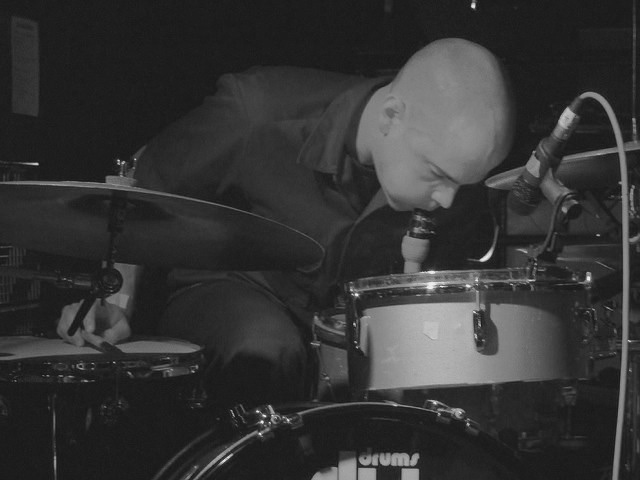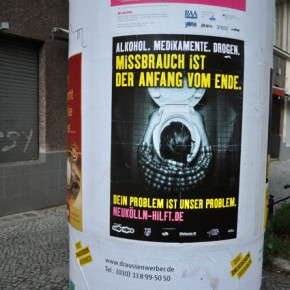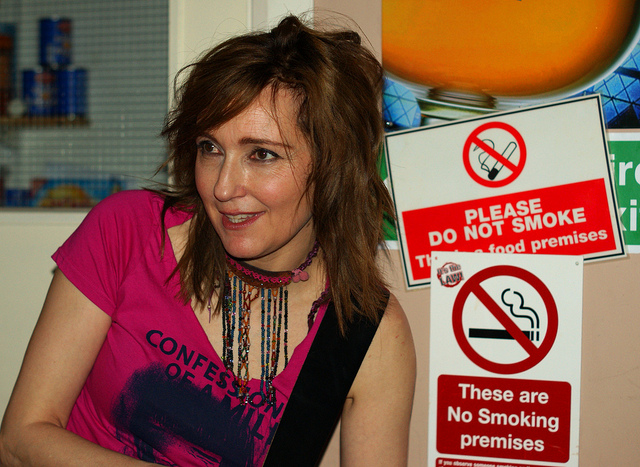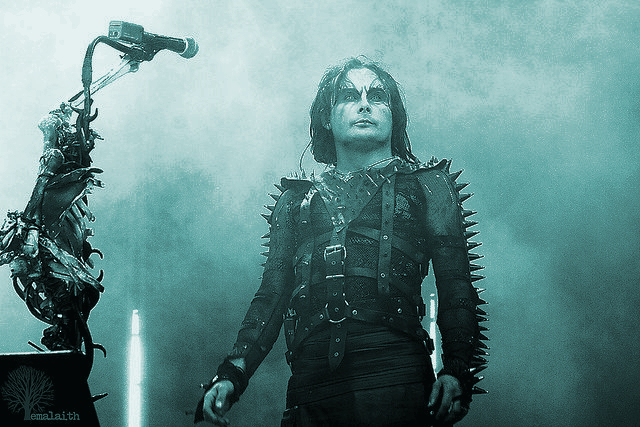In the 1970s, older folks regarded punk as untalented, amateur, and above all, noise. Only a few years after its arrival, British artists affiliated with the punk and postpunk scenes co-opted the “noise” designation, turned it into a badge of pride, and pushed the sonic envelope further than many believed possible. A controversial avant-garde and power electronics scene developed that, its adherents boasted, took the DIY spirit of punk more seriously than did many punks themselves.
The most direct link between (what would develop into) the noise and power electronics scenes, and the late ’70s punk movement, are with principal players and noise artists William Bennett, of Whitehouse, and Gary Mundy, founder of both Broken Flag records and the experimental group Ramleh. Other figures, like Philip Best of Consumer Electronics, and Italian pioneers Maurizio Bianchi and Giancarlo Toniutti, will be discussed later.
Part of the cultural narrative starts this way, believe it or not: Founding X-Ray Spex member and saxophonist Lora Logic started the postpunk band Essential Logic in 1978 after a falling out with singer Poly Styrene. Logic brought in a young punk named William Bennett to play guitar for her new band. Of course, Bennett would later go on to form the genre-defining noise band Whitehouse as well as the current Afro-Caribbean experimental project Cut Hands. But that comes later.
Bennett’s guitar work for Essential Logic is solid, Public Image Limited-style postpunk guitar stuff. On his blog, Bennett claims there are “two songs that I wrote the music for on the [Essential Logic] Beat Rhythm News album” in 1979 for which he received no credit. For this or maybe other reasons, Bennett left Essential Logic and started the Come Organisation label in 1979, a vehicle for his new postpunk band, Come. By 1980, Come – a bizarre yet still guitar-driven postpunk band that combined the creepy atmosphere of Alan Vega’s Suicide with the spartan experimentalism of Wire – had recorded several experimental songs: “Shaved Slits” and “Come Sunday.”
http://youtu.be/Ys3h0ivrl4k
An 8-song LP, Rampton, would also be released by Come by 1980. In a 2000 interview, Bennett remarked: “I found it quite ironic that the US rock and roll band Come, who ripped off their name from us, are mistakenly credited with a certain ‘Rampton’ album. Who gives a fuck about them nowadays anyway?” A rare 1979 interview with Come is at the Susan Lawly (Bennett’s record label) website.
Other important developments were happening elsewhere, but by 1980 it was clear the initial punk explosion was unfurling in a million different directions. Some bands, like Bennett’s postpunk act Come, were exploring one particular sonic and aesthetic avenue that punk’s cultural impact had illumined. It was certainly one way forward.
In America, New York City’s no wave bands (for example, DNA and Mars), and the experimental synthpunk of Los Angeles ( Screamers, Nervous Gender, etc.) were traversing roughly similar – but also regionally idiosyncratic — paths. Lydia Lunch complained that punk was turning out to be “just sped-up Chuck Berry riffs.” John Lydon similarly lamented to Tom Snyder that “rock ‘n roll is … not achieving anything, it’s just regression. They play rock ‘n’ roll at airports. That’s about as advanced as it can possibly get.” Strange, uncategorizable bands like Second Layer (the experimental side-project of postpunk band The Sound) and Clock DVA were popping up everywhere at this time. The pre-Rudimentary Peni band The Magits initially embarked on this course. There was a degree of overlap between Throbbing Gristle’s Industrial Records imprint and the nascent postpunk scene that cannot be overemphasized. “We were very influenced by how Industrial Records (Throbbing Gristle), and Ralph Records (The Residents) were administrated,” Bennett explained to Reuters in 1979.
Punks everywhere were in on the joke that their music was considered “nothing but noise.” In 1979, to emphasize the point, the Buzzcocks made the tongue in-cheek song “Noise Annoys,” a song about adults’ perception of punk as atonal noise (“Have you ever heard your parents say, ‘Noise annoys’?”) The Damned replied in kind with “Noise Noise Noise,” off their seminal 1979 Machinegun Etiquette LP: “Noise is for heroes / Leave the ‘music’ for zeroes.” If punk was to be regarded as a loud and sloppy discordant racket, at least punk bands could have a sense of humor about it.
In the meantime, Gary Mundy, later of seminal noise band Ramleh, was in the goth-ishly named rock group A Cruel Memory. Shortly thereafter, Mundy, originally a postpunk guitarist like kindred soul William Bennett, joined Breathless, a dark postpunk band often compared favorably to The Chameleons and Echo and the Bunnymen (Allmusic refers to Breathless as “dark, moodily romantic U.K. post-punk rock.”) But Mundy was also working on other projects, including the novel – and, as it would turn out, seminal – noise label Broken Flag, as well his own power electronics band, Ramleh.
To fast-forward for a second, in May of this year, Mundy’s Broken Flag noise label celebrated its 30th anniversary with a series of well-attended shows in England. A Broken Flag retrospective was likewise released a few years ago, and it included the following statement from Gary Mundy about the philosophy that served as the original impetus for his noise-oriented adventures with Broken Flag in the early 1980s:
“Broken Flag began in 1982 as a reaction to the way music seemed to be heading. A lot of the artists who were playing interesting music in the post-punk period were heading more and more towards conventional funk and pop music. I wanted to move further in the opposite direction. Around this time I went to see Whitehouse at the Whiskey-a-Go-Go in London. It was their first ‘live action’ and I was really impressed. It was exactly where I wanted to go. I went home and formed Ramleh and Broken Flag within a matter of days. I know I didn’t want to be exactly like Whitehouse but I wanted something in that style.”
The postpunk bands veering more towards “funk and pop music” that Mundy mentions — that refers to bands like the Pop Group, Josef K, and Gang of Four, all of whom are seminal postpunk groups that started as angular, political agitprop acts but who later began to incorporate dancey, funk elements into their sound by the early and mid-1980s. Even Killing Joke, vis a vis “Nervous System,” proved they were not above caving into the “dancey” trend of the time. Mundy and others wanted to push back against this, and explore the noisier promises of the DIY punk animus. A certain contrarian spirit was always in punk’s DNA, and so it was time to rebel against the rebels. The early noise projects wanted to do this in a way that would challenge listeners’ perceptions as to what music was really capable of, or capable of being, much in line with the original promise of the punk rock explosion itself.
“Broken Flag began in 1982 as an attempt to introduce an alternative to the cancer of the electro-funk/avant trend that was sweeping through the independent music market,” Mundy wrote in his zine 1985. “[W]e took to re-proving the punk ethic that anyone can do it and do it alone and cheaply — we created a new form of tape-package and took on the first steps towards record distribution. […] We have not gained acceptance or popularity, but have pursued that which we believe to be worthwhile — we shall continue, but will promise that when our enthusiasm runs out, we shall leave with it.”
“Noise” is usually defined as sound that is unwanted. In fact, the always-trustworthy Wikipedia says: “In common use, the word noise means any unwanted sound.” Mundy’s Broken Flag label would become a who’s who of the burgeoning noise and power electronics scene: Maurizio Bianchi (MB), Giancarlo Toniutti, Mauthausen Orchestra, Sutcliffe Jugend, and others.
Serendipitously, in 1977 French economist Jacques Attali would release the book Noise: The Political Economy of Music. It contained this famous passage, something that echoed the sentiments of many punk upstarts across the channel:
“What is called music today is all too often only a disguise for the monologue of power. However, and this is the supreme irony of it all, never before have musicians tried so hard to communicate with their audience, and never before has that communication been so deceiving. Music now seems hardly more than a somewhat clumsy excuse for the self-glorification of musicians and the growth of a new industrial sector.”
Attali probably did not know his own rant about “the self-glorification of musicians” perfectly dovetailed with the punk movement’s take on the idea of rock stardom, much less the more ambitious punk and postpunk challenge to what, exactly, “music” constituted. And he probably could not have foreseen that postpunk musicians would abandon the punk “rock” narrative entirely to experiment with pure, squalling white noise, purposefully lo-fi recordings, and other innovations made possible only by modern industrial technological developments, to develop an almost entirely sui generis style of “difficult” music.
In Mundy’s Broken Flag zine, Interchange writer J. Smith explained, “To redefine music we have to be able to redefine what we term ‘meaningful’ sound and that it is interesting to note that much of the most ‘difficult’ music uses sounds which we have been conditioned to define as ‘non-meaningful’ or sounds that have had their meaning taken away from them.” Additionally, the newer projects “demand the redefinition of music (of course another demand is that it should be interesting!)”
In Part 2: Italy, Japan, and British noise in the 1980s. Ramleh photograph courtesy of Andynew.






Check out our EP churchcampband.bandcamp.com